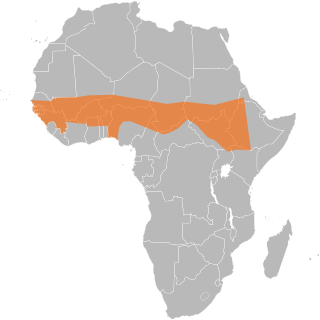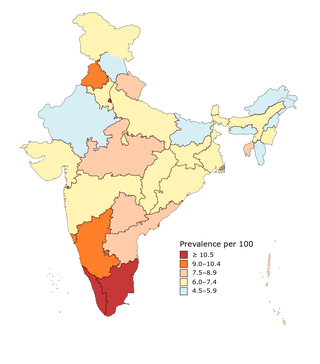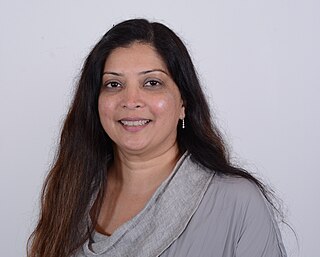Related Research Articles

Hearing loss is a partial or total inability to hear. Hearing loss may be present at birth or acquired at any time afterwards. Hearing loss may occur in one or both ears. In children, hearing problems can affect the ability to acquire spoken language, and in adults it can create difficulties with social interaction and at work. Hearing loss can be temporary or permanent. Hearing loss related to age usually affects both ears and is due to cochlear hair cell loss. In some people, particularly older people, hearing loss can result in loneliness.

Yaws is a tropical infection of the skin, bones, and joints caused by the spirochete bacterium Treponema pallidum pertenue. The disease begins with a round, hard swelling of the skin, 2 to 5 cm in diameter. The center may break open and form an ulcer. This initial skin lesion typically heals after 3–6 months. After weeks to years, joints and bones may become painful, fatigue may develop, and new skin lesions may appear. The skin of the palms of the hands and the soles of the feet may become thick and break open. The bones may become misshapen. After 5 years or more, large areas of skin may die, leaving scars.
Obstetrical bleeding is bleeding in pregnancy that occurs before, during, or after childbirth. Bleeding before childbirth is that which occurs after 24 weeks of pregnancy. Bleeding may be vaginal or less commonly into the abdominal cavity. Bleeding which occurs before 24 weeks is known as early pregnancy bleeding.
A delayed milestone, which is also known as a developmental delay, refers to a situation where a child does not reach a particular developmental milestone at the expected age. Developmental milestones refer to a collection of indicators that a child is anticipated to reach as they grow older.

The African meningitis belt is a region in sub-Saharan Africa where the rate of incidence of meningitis is very high. It extends from Senegal to Ethiopia, and the primary cause of meningitis in the belt is Neisseria meningitidis.

A general movements assessment is a type of medical assessment used in the diagnosis of cerebral palsy, and is particularly used to follow up high-risk neonatal cases. The general movements assessment involves measuring movements that occur spontaneously among those less than four months of age and appears to be most accurate test for the condition.
Nora Ellen Groce is an anthropologist, global health expert and Director of the Disability Research Centre at University College London. She is known for her work on vulnerable populations in low- and middle-income countries and in particular for her work on people with disabilities in the developing world. Her doctoral dissertation, published by Harvard University Press in 1985, Everyone Here Spoke Sign Language: Hereditary Deafness on Martha’s Vineyard, is considered a classic work in the disability studies and ethnographic literatures.
An audiologist, according to the American Academy of Audiology, "is a person who, by virtue of academic degree, clinical training, and license to practice and/or professional credential, is uniquely qualified to provide a comprehensive array of professional services related to the prevention of hearing loss and the audiologic identification, assessment, diagnosis, and treatment of persons with impairment of auditory and vestibular function, and to the prevention of impairments associated with them."

Terry M. McGovern is an American public health scholar. She is the Senior Associate Dean for Academic and Faculty Affairs at CUNY Graduate School of Public Health & Health Policy in New York City. McGovern is also Professor of Health Policy and Management.

Oriol Mitjà i Villar is a Catalan-born Spanish researcher and consultant physician in internal medicine and infectious diseases with expertise in poverty-related tropical diseases. He has conducted research at the Lihir Medical Centre in Papua New Guinea since 2010 on new diagnostic and therapeutic tools to eradicate yaws. He was awarded the Princess of Girona Award in the scientific research category. Currently at the Germans Trias i Pujol Research Institute, Mitjà is conducting research on SARS-CoV-2 coronavirus disease (COVID-19) and strategies to control the infection at a community level.
Kathleen Maletic Neuzil is the Director of the Center for Vaccine Development at the University of Maryland School of Medicine. She was elected to the National Academy of Medicine in 2019.

India has an estimated 212 million people with diabetes out of 828 million globally. One in four people (26%) in the world with diabetes is from India, making it the most affected country in the world.
Kathryn Maitland is a British paediatrician who is professor of infectious diseases at Imperial College London, director of the ICCARE Centre at the Institute of Global Health Innovation and an Honorary Fellow at Medical Research Council Clinical Trials Unit, University College, London. Since 2000 she has been based at the KEMRI-Wellcome Trust Research Programme, in Kilifi, Kenya.
Karen Simmer is an Australian paediatrician and professor of Newborn Medicine at the University of Western Australia and is director of two neonatal intensive care units at hospitals in Perth. She also runs the WA Human Milk Bank and is team leader, neonatal gut health, nutrition and development at the Telethon Kids Institute.

Etheldreda Nakimuli-Mpungu is a professor, researcher, epidemiologist and psychiatrist at the Department of Psychiatry in the Faculty of Medicine, Makerere University in Uganda. Her research is particularly focused on supportive group psychotherapy as a first-line treatment for depression in people with HIV. She is one of only five recipients of the Elsevier Foundation Award for Early Career Women Scientists in the Developing World in Biological Sciences, as well as listed at one of the BBC's 100 Women in 2020.
Post-abortion care (PAC) is treatment and counseling for post-abortion women. It includes curative care, such as treating abortion complications, as well as preventative care, such as providing birth control to prevent future unwanted pregnancies. Post-abortion care reduces morbidity and mortality associated with abortion.
Elimination of tuberculosis is the effort to reduce the number of tuberculosis (TB) cases to less than one per 1 million population, contrasted with the effort to completely eradicate infection in humans worldwide. The goal of tuberculosis elimination is hampered by the lack of rapid testing, short and effective treatment courses, and completely effective vaccine. The WHO as well as the Stop TB Partnership aim for the full elimination of TB by 2050—requiring a 1000-fold reduction in tuberculosis incidence. As of 2017, tuberculosis has not been eliminated from any country.
Penny M. Heaton is an American physician who is the Global Therapeutics Lead for Vaccines at Johnson & Johnson. She previously worked at Novavax, Novartis and the Bill & Melinda Gates Foundation. She was included by Stat News on their definitive list of leaders in the life sciences in 2022.

Rita V. Krishnamurthi is a New Zealand academic, and since 2023 is a full professor at the Auckland University of Technology, specialising in the epidemiology of stroke and dementia.
Pratibha Singhi is an Indian pediatric neurologist. As the first pediatric neurologist in the country, she built the fields of pediatric neurology and neurodevelopment there. She is head of pediatric neurology at Amrita Hospital, Faridabad. Formerly she was director of pediatric neurology and neurodevelopment at Medanta, and chief of pediatric neurology and neurodevelopment in the department of pediatrics, Post Graduate Institute of Medical Education and Research (PGIMER), Chandigarh.
References
- 1 2 3 "Bolajoko Olusanya: personal challenges, public health". Bulletin of the World Health Organization. 97 (10): 652–653. 1 October 2019. doi: 10.2471/BLT.19.031019 (inactive 5 December 2024). PMC 6796670 . PMID 31656329.
{{cite journal}}: CS1 maint: DOI inactive as of December 2024 (link) - ↑ Olusanya, Bolajoko Olubukunola (31 January 2008). "Infant hearing screening models for the early detection of permanent childhood hearing loss in Nigeria". UCL. UCL (University College London). Retrieved 3 May 2020.
- ↑ "Bolajoko Olusanya (0000-0002-3826-0583)". Orcid. Retrieved 3 May 2020.
- ↑ "Prof. Ricardo Bento is invited to integrate the OMS/Lancet Commission for Hearing Loss". www.fm.usp.br. Retrieved 3 May 2020.
- ↑ "Expert: Electricity generators, major cause of hearing loss in Nigeria". Today. 22 June 2018. Retrieved 3 May 2020.
- ↑ "Study Shows Children with Developmental Disabilities on the Rise in Nigeria". This Day Live. 6 September 2018. Retrieved 3 May 2020.